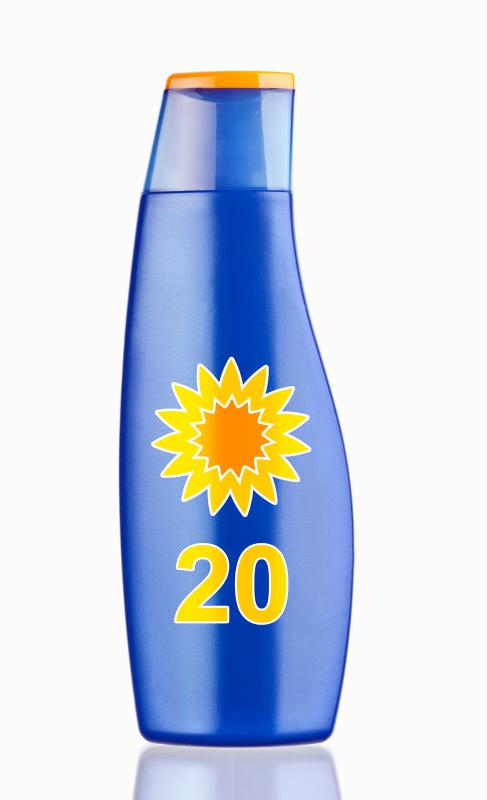At WiseGEEK, we're committed to delivering accurate, trustworthy information. Our expert-authored content is rigorously fact-checked and sourced from credible authorities. Discover how we uphold the highest standards in providing you with reliable knowledge.
How Do I Choose the Best Sunscreen for Oily Skin?
To choose the best sunscreen for oily skin, you need a product that is oil-free that will not block your pores or irritate your skin. You also need the protection of both physical and chemical sunscreens. If you are using the sunscreen on your face, you will want one that dries to a powder or matte finish. Before shopping for sunscreen for oily skin, you should understand how the ingredients in sunscreens work and how they affect your skin.
There are two types of sunscreen: physical and chemical. A physical sunscreen, also called sunblock, actually remains on the outside of your skin and creates a thin, protective layer that reflects the sun. Typical sunblock ingredients are zinc oxide and titanium dioxide. Both protect against ultraviolet A and B rays (UVA and UVB) but often leave a white residue on the skin. Titanium dioxide is non-comedogenic, which means it will not block your pores. It is also good for sensitive skin and, typically, does not cause inflammation or other allergic reactions.

A sunscreen, or chemical protectant, is absorbed by your skin. The chemicals absorb harmful UVA and UVB rays, preventing them from damaging your skin. Some common chemical sunscreen ingredients are avobenzone, mexoryl, helioplex, octylcrylene, tinosorb, and uvinul. Chemical sunscreens are not as thick as sunblocks, and they usually leave no white residue. They can, however, irritate sensitive skin.

Many chemical sunscreens do not provide protection against both UVA and UVB rays. For the best coverage, you need a combination of sunblock and chemical sunscreen. Sunscreen for oily skin should have the advantages of sunblock, which won't irritate your skin, but come in a thinner formula that dries to a powder.
Look for a product which states that it is oil-free, non-comedogenic, and hypoallergenic. You may not usually have sensitive skin, however, many sunscreen chemicals are concentrated. Your skin may not react well if the formula is too strong.

If you believe you will pespire heavily or if you plan to swim, look for a waterproof sunscreen. A waterproof formula will last longer than a water-resistant formula, and you won't have to reapply it as often. Waterproof formulas are available for face and body sunscreens.
Some foundations and facial moisturizers include sunscreen for oily skin in their formulas. As with any other sunscreen, look for the ingredients that you need to get the best coverage, as well as oil-free, non-comedogenic formulas. You will also want to have a foundation that dries to a powder, or matte, finish.
AS FEATURED ON:
AS FEATURED ON:














Discussion Comments
Titanium dioxide is also supposed to treat oily skin and protect from sun but it makes my skin ghostly white so I avoid sunscreens with that ingredient.
Unless I'm going to the beach and need a heavy-duty sunscreen, I actually like adding a few drops of grapeseed oil or jojoba oil in my regular moisturizer for sun protection benefits.
If I need something heavy duty, then I go for any over-the-counter sunscreen that is oil free and SPF 50.
@fBoyle-- There are natural oils like olive oil and coconut oil that provide some protection from the dangerous effects of sun (not sunburn) but they're going to be too heavy for oily skin. It will block your pores and cause breakouts. And most people don't want to only block out sun's bad rays, they want to protect from sunburn too.
I think zinc oxide is your best bet. It protects from sun and is great for oily skin. I use an oily skin moisturizer with zinc oxide all year around because it has healing properties and calms my skin.
Most people don't realize this but zinc oxide is also the active ingredient in baby rash cream.
I can only use mattifying sunblock on my face, otherwise I get acne. Mattifying sunblock is good for oily skin but sometimes I feel like it's too drying. It probably has to do with sun and heat in the summer as well.
Are there any natural sunscreens out there that protect and moisturize without causing acne?
Post your comments